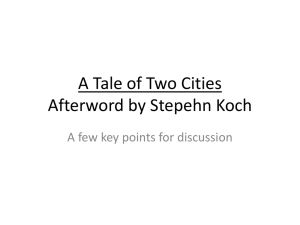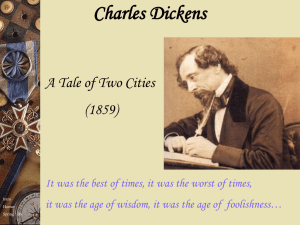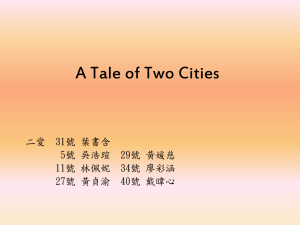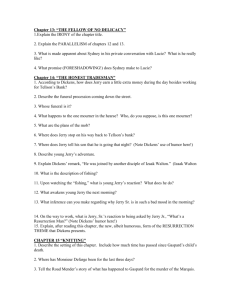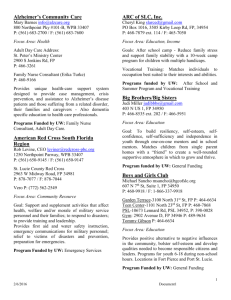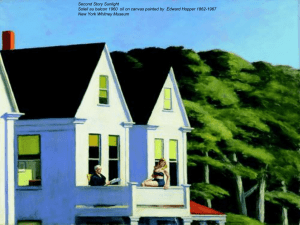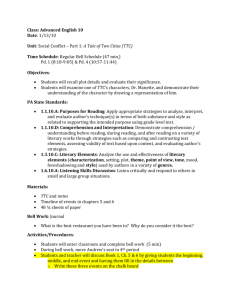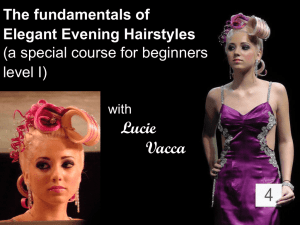A Tale of Two Cities Essay The final three journal entries
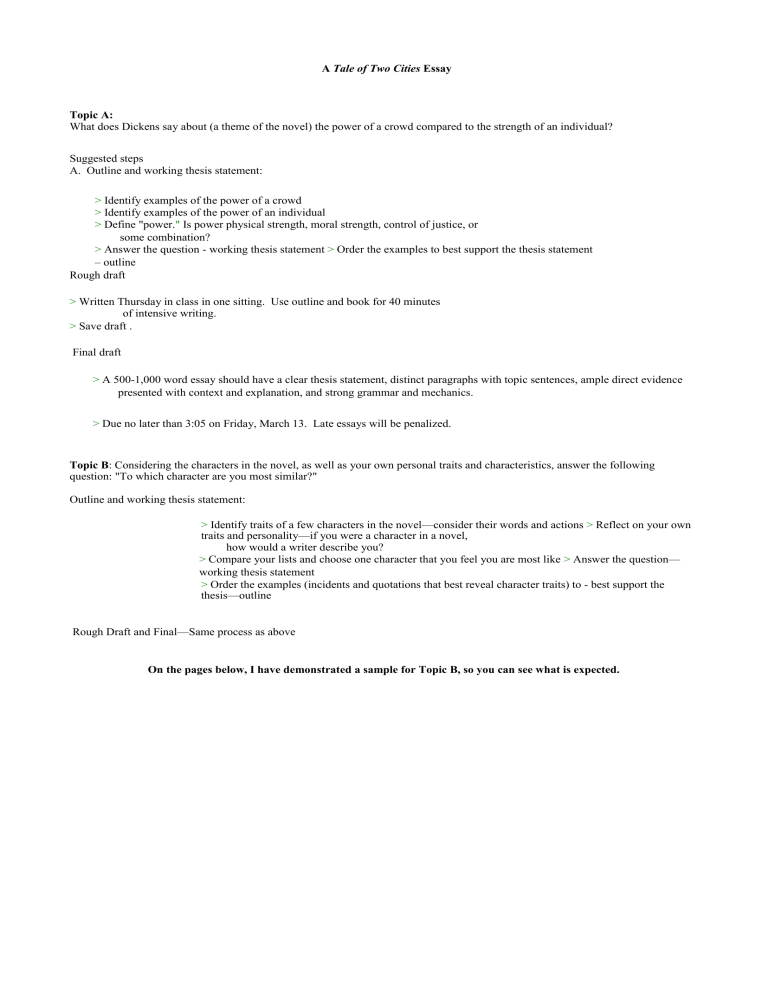
A Tale of Two Cities Essay
Topic A:
What does Dickens say about (a theme of the novel) the power of a crowd compared to the strength of an individual?
Suggested steps
A. Outline and working thesis statement:
> Identify examples of the power of a crowd
> Identify examples of the power of an individual
> Define "power.
" Is power physical strength, moral strength, control of justice, or some combination?
> Answer the question - working thesis statement > Order the examples to best support the thesis statement
– outline
Rough draft
> Written Thursday in class in one sitting. Use outline and book for 40 minutes of intensive writing.
> Save draft .
Final draft
> A 500-1,000 word essay should have a clear thesis statement, distinct paragraphs with topic sentences, ample direct evidence presented with context and explanation, and strong grammar and mechanics.
> Due no later than 3:05 on Friday, March 13. Late essays will be penalized.
Topic B : Considering the characters in the novel, as well as your own personal traits and characteristics, answer the following question: "To which character are you most similar?"
Outline and working thesis statement:
> Identify traits of a few characters in the novel—consider their words and actions > Reflect on your own traits and personality—if you were a character in a novel, how would a writer describe you?
> Compare your lists and choose one character that you feel you are most like > Answer the question— working thesis statement
> Order the examples (incidents and quotations that best reveal character traits) to - best support the thesis—outline
Rough Draft and Final—Same process as above
On the pages below, I have demonstrated a sample for Topic B, so you can see what is expected.
Outline and working thesis
1.
Characters’ traits a.
Lucie Manette: golden hair, blue eyes, devoted to father and husband, compassionate [“God bless you for your sweet compassion!” (153)] b.
Sydney Carton: a drunk, in love with Miss Manette, brave and generous [“Brave and generous friend, will you let me ask you one last question?” (365)], “…that it was the peacefullest man’s face ever beheld there. Many added that he looked sublime and prophetic” (366). c.
Miss Pross: red hair, very strong and determined, devoted to helping “Ladybird” and her family, “Miss Pross had nothing beautiful about her; years had not tamed the wildness, or softened the grimness, of her appearance; but, she too, was a determined woman in her different way…” (358), killed Madame Defarge
2.
My traits and personality a.
Blonde hair b.
Blue eyes c.
Lanky d.
Shy e.
Devoted to my family, friends, and country f.
Intelligent g.
Musical h.
Athletic i.
Compassionate j.
Giving k.
Loves animals
3.
I feel that I am most life Lucie Manette
4.
Tentative Thesis: Although Lucie Manette and I seem to have similar aspects physically, I have discovered that emotionally we share common traits as well, such as compassion.
5.
Quotes a.
“She appeared to have innately derived from it that ability to make much of little means…” (99). b.
“…mingled with the affection and duty of a daughter who has become a woman, there is, in her heart, towards you, all the love and reliance of infancy itself” (137). c.
“…a short, slight, pretty figure, a quantity of golden hair, a pair of blue eyes that met his own with an inquiring look, and a forehead with a singular capacity” (29). d.
“Lucie, my child, if ever you were brave and serviceable in your life-and you were always both- you will compose yourself now, to do exactly as I bid you” (259). e.
“She had drawn close to him (Doctor Manette), in her dread of the scene, and in her pity for the prisoner. Her forehead had been strikingly expressive of an engrossing terror and compassion that saw nothing but the peril of the accused. This had been so very noticeable, so very powerfully and naturally shown, that starers who had had no pity for him (Charles Darnay) were touched by her…” (72).
Rough Draft
Although Lucie Manette and I have grown up in very different environments, and succumbed to very different circumstances, we share several common ties. Both physically and emotionally, we are linked by similar characteristics that define who we are as individuals. Throughout A Tale of Two Cities, I have discovered many traits that Lucie possess, that I also see in myself.
The first and most obvious similarity that Lucie and I share is our appearance. Dickens describes Lucy as “…a short, slight, pretty figure, a quantity of golden hair, a pair of blue eyes…and a forehead with a singular capacity” (29). In comparison, as told to me by one of my peers, I can be described as a “tall, pretty, thin, fair-skinned, blue eyed, blond haired” teenager.
Lucie, at the beginning of A Tale of Two Cities
, was also a teenager. Dickens refers to Lucie’s forehead expressions many times throughout the novel: “Her forehead had been strikingly expressive of an engrossing terror and compassion that saw nothing but the peril of the accused” (72). Statements such as this are extremely ironic to me because I am often singled out for my extreme facial expressions. Where Lucie uses her forehead to articulate her every emotion, I use my eyes. My orthodontist once told me, while pulling at my teeth, that I could be an actress simply because of the amount of emotion that
I expressed through my eyes.
Another similarity between Lucie and me is our devotion to our families. Lucie’s undying devotion to her father is well warranted, considering that she did not know him until she was seventeen years old. “Mingled with the affection and duty of a daughter who has become a woman, there is, in her heart, towards you (Doctor Manette), all the love and reliance of infancy itself” (137). This quote perfectly resembles Lucie’s devotion to her father. Once Lucie married Charles Darnay, she became equallydevoted to him and their new family. She rushed all the way to chaotic France in search of her husband.
This act of love showed her true devotion to Charles. Although I am not married, I am devoted to my family like Lucie. My siblings may consider me to be a “daddy’s girl,” but I can’t deny it. I cling to my father in hard times, just as Lucie does.
When my father is sick, I help to take care of him, just as Lucie does.
Another characteristic that Lucie and I both possess is compassion. When Sydney Carton came to Miss Manette and expressed his love for her, she was very compassionate for his feelings. He even expressed, “God bless you for your sweet compassion!” (153). She allowed Mr. Carton to come into her house uninvited just to be there. She was a person that liked to please everyone. I consider myself to be similar to her. I have great compassion for all things. My mother often tells me that I should be a doctor or a veterinarian, because I have such great compassion for people and animals. After September
11 th , 2001, I was determined to give blood, but I am not old enough. Many may say that that occasion showed my compassion for the situation and for humanity.
Bravery is another common link between Lucie and me. Lucie was brave on several occasions. She was brave when she approached her deranged father for the first time: “He (Doctor Manette) had a wild, lost manner of occasionally clasping his head in his hands, that had not been seen in him before; yet, he had some pleasure in the mere sound of his daughter’s voice, and invariably turned to it when she spoke” (55). She was also brave when she traveled to France in an attempt to find her husband, and when she fled France with the risk of being caught and put on trial. Although I have never visited my father when he was insane, traveled to France to find my husband, or fled from the bloodthirsty scarecrows, I consider myself to be brave like Lucie. As a child, I jumped out of a two-story window, conquered a water slide with an almost ninety degree drop , and considered going into the army. I believe that these, along with several other situations in my life, prove that I am brave.
Similarities such as appearance and braveryprove what I have suspected from the beginning of A Tale of Two Cities , that
Lucie Manette and I are alike. Although she was born in the 18 th
century and I was born in the 20 th
, we both share common bonds like a time of war. The French Revolution causes panic, sadness, and loss in her life. In comparison, the war on
Afghanistan causes panic, sadness, and a feeling of great loss in my life everyday. Many readers cannot identify with the deep similarities I have discovered between Lucie Manette and me. I only hope that I can continue to display the positive characteristics of Miss Manette as I live my life, while maintaining my individuality
Final Copy
Although Lucie Manette and I have grown up in very different environments, and succumbed to very different circumstances, we share several common ties. Both physically and emotionally, we are linked by similar characteristics that define who we are as individuals. Throughout A Tale of Two Cities, I have discovered many traits that Lucie possess, that I also see in myself.
The first and most obvious similarity that Lucie and I share is our appearance. Dickens describes Lucy as “…a short, slight, pretty figure, a quantity of golden hair, a pair of blue eyes…and a forehead with a singular capacity” (29). In comparison, as told to me by one of my peers, I can be described as a “tall, pretty, thin, fair-skinned, blue eyed, blond haired” teenager. Lucie, at the beginning of
A Tale of Two Cities
, was also a teenager. Dickens refers to Lucie’s forehead expressions many times throughout the novel: “Her forehead had been strikingly expressive of an engrossing terror and compassion that saw nothing but the peril of the accused” (72). Statements such as this are extremely ironic to me because I am also singled out for my extreme facial expressions. Where Lucie uses her forehead to articulate her every emotion, I use my eyes. My orthodontist once told me, while pulling at my teeth, that I could be an actress simply because of the amount of emotion that I expressed through my eyes.
Another similarity between Lucie and me is our devotion to our families. Lucie’s undying devotion to her father is well warranted, considering that she did not know him until she was seventeen years old. “Mingled with the affection and duty of a daughter who has become a woman, there is, in her heart, towards you [Doctor Manette], all the love and reliance of infancy itself” (137). This quote perfectly resembles Lucie’s devotion to her father. Once Lucie married Charles Darnay, she became equally devoted to him and their new family. She rushed all the way to chaotic France in search of her husband.
This act of love showed her true devotion to Charles. Although I am not married, I am devoted to my family like Lucie. My siblings may consider me to be a “daddy’s girl,” but I can’t deny it. I cling to my father in hard times, just as Lucie does.
When my father is sick, I help to take care of him, just as Lucie does.
Another characteristic that Lucie and I both possess is compassion. When Sydney Carton came to Miss Manette and expressed his love for her, she was very compassionate towards him. She only said the sweetest words to him as he opened his heart to her. He even expressed, “God bless you for your sweet compassion!” (153). Lucie was the kind of person that
liked to please everyone. I consider myself to be similar to her. I have great compassion for all things. My mother often tells me that I should be a doctor or a veterinarian, because I have such great compassion for people and animals. Although
I love to help people and animals, I am too compassionate to hurt them in order to help them.
Bravery is another common link between Lucie and me. Lucie was brave on several occasions. She was brave when she approached her deranged father for the first time: “He [Doctor Manette] had a wild, lost manner of occasionally clasping his head in his hands, that had not been seen in him before; yet, he had some pleasure in the mere sound of his daughter’s voice, and invariably turned to it when she spoke” (55). She was also brave when she traveled to France in an attempt to find her husband, and when she fled France with the risk of being caught and put on trial. Although I have never visited my father when he was insane, traveled to France to find my husband, or fled from the bloodthirsty scarecrows, I consider myself to be brave like Lucie. As a child, I jumped out of a two-story window, conquered a water slide with an almost ninety degree drop, and considered going into the army. I believe that these, along with several other situations in my life, prove that I am brave.
Similarities such as appearance and bravery prove what I have suspected from the beginning of A Tale of Two Cities , that Lucie Manette and I are alike. Although she was born in the 18 th
century and I was born in the 20 th
, we both share common bonds like a time of war. The French Revolution causes panic, sadness, and loss in her life. In comparison, the war on Afghanistan causes panic, sadness, and a feeling of great loss in my life everyday. Many readers cannot identify with a character as I have with Lucie Manette. I only hope that I can continue to display the positive characteristics of Miss Manette as I live my life, while maintaining my individuality.
